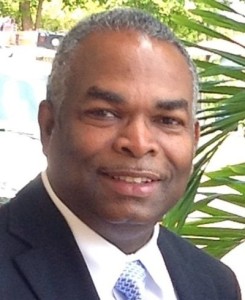 Superintendent Dr. Owen Roberts of Alachua County is a member of the committee. His plan for revitalizing schools in the county was the subject of a post yesterday.
Superintendent Dr. Owen Roberts of Alachua County is a member of the committee. His plan for revitalizing schools in the county was the subject of a post yesterday.
The charge to the committee is far reaching. It will explore:
LWVeducation
 Alachua County, Florida Superintendent Owen Roberts announced a plan to restructure three elementary schools. Two are struggling schools that have received funding to extend school days, add teachers, and add tutors. The schools still struggle, and they are under enrolled. Part of the problem is due to students who leave for charters and private schools in hopes of improving access to better schools. Unfortunately, those options make little difference for those students either. So, what do you do when conventional wisdom does not help? Continue reading
Alachua County, Florida Superintendent Owen Roberts announced a plan to restructure three elementary schools. Two are struggling schools that have received funding to extend school days, add teachers, and add tutors. The schools still struggle, and they are under enrolled. Part of the problem is due to students who leave for charters and private schools in hopes of improving access to better schools. Unfortunately, those options make little difference for those students either. So, what do you do when conventional wisdom does not help? Continue reading
 Representative Mayfield filed HB 877 to make legal options for parents to opt their children out of state assessments. The bill, according to the Tampa Bay Times, requires parents to file a written request to exempt their children from state wide assessments.
Representative Mayfield filed HB 877 to make legal options for parents to opt their children out of state assessments. The bill, according to the Tampa Bay Times, requires parents to file a written request to exempt their children from state wide assessments.
There are some strings attached.
 COMMON CORE: Are We IN or OUT?
COMMON CORE: Are We IN or OUT?
There is much angst about Common Core Standards (CCS). People disagree about what children should know and be able to do. The new standards focus on learning how to evaluate how well students understand what they read and how well they grasp math concepts. All students are expected to be college and career ready. The arguments have a familiar ring. Students differ. The Florida League of Women Voters asks: Is it fair to have the same high expectations for all students? Is it fair not to? Is this even the correct question?
Some say that the standards are not the problem, the amount of testing required to measure the standards. They argue that testing to evaluate teachers and schools is misguided. How is the Florida legislature responding? Is it possible to find some common ground?
 An important vote on H.R. 5 is scheduled Friday. While the League of Women Voters supports national curriculum guidelines and assessment of skills that compares the student achievement across similar districts, it also supports local implementation of the curricula and skills. The operative definition of the League’s position is that all children should have access to an equitable, quality education. To what extent does this bill have the desired result?
An important vote on H.R. 5 is scheduled Friday. While the League of Women Voters supports national curriculum guidelines and assessment of skills that compares the student achievement across similar districts, it also supports local implementation of the curricula and skills. The operative definition of the League’s position is that all children should have access to an equitable, quality education. To what extent does this bill have the desired result?
The bill severely cuts the role of the U.S. Department of Education. It also freezes funding until 2021. Finally, it increases support for charter schools and allows Title I funding for low income schools to be moved to other schools. The bill has generated controversy. Specific requirements follow.
If you wish to contact your legislators, a contact list is below.
 Education Commissioner Pam Stewart issued her report on high stakes testing in Florida. Yes, students are tested too much. Some testing can be eliminated. Which ones?
Education Commissioner Pam Stewart issued her report on high stakes testing in Florida. Yes, students are tested too much. Some testing can be eliminated. Which ones?
Are the recommendations meaningful or just a peace offering? The report lists the number of days of required statewide testing as seven or fewer, but districts have many more mandated tests. Their tests, however, tend to be used to diagnose learning problems as students progress throughout the year.
Senators Montford and Legg have filed bills to modify the Florida Accountability System. Their views differ, particularly on the dates for implementing the accountability measures for school grades and teacher evaluations. Both bills address district readiness capacity for computer based testing.
 This bill is an assault on the teaching profession. The logic behind the bill is mysterious. It would seem to advocate that the most successful teachers be replaced with uncertified teachers. Why would this be a good idea?
This bill is an assault on the teaching profession. The logic behind the bill is mysterious. It would seem to advocate that the most successful teachers be replaced with uncertified teachers. Why would this be a good idea?
Read on!Continue reading
REPORT ON FEBRUARY 9, 2015 COURT HEARING
ISSUE: STANDING FOR VOUCHER LAWSUIT, McCALL v. SCOTT:
The issue before the court in my lay person’s was precisely this: If the court finds that teachers, school administrators, parents, students and taxpayers have no standing to challenge the legislature’s indirect funding of Florida’s Corporate Tax Credit Scholarship program, who in the state of Florida does?
In Leon County Court yesterday appearing before County Circuit Judge George Reynolds III, the state and intervenors argued that because corporate tax payments are diverted before they enter state tax coffers the money is “exempt” from other regulation or compliance with constitutional restrictions. Their argument was that tax credits issued to corporations that elect to contribute to the FTC program are the same as other contributions to 501 c-3 entities and therefore opening the program up to scrutiny would extend the issue to ALL 501 c-3 contributions.
The judge summarized their argument by stating that “the money never became public” so taxpayers have no standing. The defendants also argued that just because funds are paid into the treasury or are due the treasury it does not follow that all or a specific portion of that money would flow through to public schools. Therefore there was no special injury. In fact, they argued that by sending students to private schools at a lesser cost the state benefitted from the program and school districts had lower costs.
The plaintiffs (the LWV of Florida is joined as a plaintiff) argued, that the state cannot do indirectly what it is constrained from doing directly referring to the FL Supreme Court decision of 2006 in Bush v. Holmes that found Opportunity Scholarships unconstitutional. While it was evident that the judge was eager to argue the merits of the case, the hearing was to establish standing for the plaintiffs and the merits were not relevant at this time. Ron Meyer and John West for the plaintiffs kept following the train of funding through to public schools related to the reduction in students enrolled and diverted through the FTC program. It was a difficult argument to make because funding fluctuates and is an established purview of the legislature.
The judge summarized their case by comparing the issue to a fuel truck with a load of fuel, but the truck was diverted prior to delivery thereby depriving the initial recipient of fuel. Once again the judge showed a desire to get into the merits, but, of course, the standing of the plaintiffs must be established.
One other issue that seemed to give the judge pause was his prior decision of several weeks earlier granting standing to the case represented by the Southern Legal Counsel titled Citizens for Strong Schools v. DOE. The LWV of Florida had contemplated joining as plaintiff, but the judge determined that the timing was too late and no additional interest was served. The third suit wherein, Judge Francis had found no standing was Faase v. Legislature and this case was dismissed with prejudice, meaning it cannot be refiled. Judge Reynolds will have to reconcile these competing opinions and actions in his final ruling.
Judge Reynolds directed attorneys for both sides to draft a final order favoring their case within ten days for his final review. This is a common approach in a case of this type. There was no indication of how he might decide or a final date given.
The audience was comprised of many interested parties. Teachers, college students, parents, children, league members, P.T. A. representative, Neil Chonin and Jodi Seigel from the Southern Legal Counsel, NAACP, Florida School Boards Assoc., and the list goes on. We will continue to follow and post information on this topic.
 New legislation regarding charter schools is beginning to appear in the Florida Legislature. This one makes it easier for charters designated as ‘high performing’ to expand. The bill does give districts some ability to designate needed charters.
New legislation regarding charter schools is beginning to appear in the Florida Legislature. This one makes it easier for charters designated as ‘high performing’ to expand. The bill does give districts some ability to designate needed charters.
This is a bill to watch. A summary and link to the bill follows.
Imagine, a billion  dollars for little children. This is the amount proposed in Governor Scott’s new budget. If passed by the legislature, school readiness programs will get larger and better.
dollars for little children. This is the amount proposed in Governor Scott’s new budget. If passed by the legislature, school readiness programs will get larger and better.
The Senate Education Committee has passed out a bill on how to improve how day care centers are run.
Read on to see what is possible.